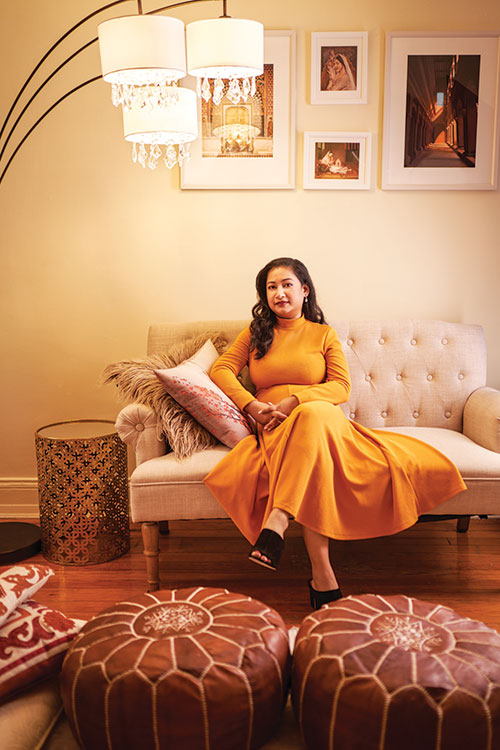
Growing up in Bangladesh, Fatima Anwar ’11 often visited her grandfather’s clothing factory, where the whirring of machines and the efficient movements of the workers enchanted her. She moved away to attend Colgate, where she studied economics and international relations, and then worked in marketing strategy for Fortune 500 companies in New York City for several years. But a trip home to visit family in 2016 set her on a different path. Anwar saw how the country had committed to improve working conditions in manufacturing — in response to a deadly factory collapse in 2013 that made international headlines — and decided to start her own apparel company, one with a focus on ethics and sustainability.
“I wanted to go back and offer something that brought more economic opportunity for women and followed the principles of social good,” Anwar says. “I knew there was a need and, given my background, I could help fill that need.”
Her company, Ethical and Sustainable Sourcing, adheres to several guidelines for its work linking mid-sized U.S. apparel companies with manufacturers in Bangladesh: ensure workers, most of whom are women, are given fair wages, a safe workplace, and the right to unionize, as well as access to basic medical care and facilities such as nursing rooms. The company also prioritizes sustainability in the manufacturing process, which includes growing organic cotton without toxic pesticides, conserving water while dyeing and washing fabrics, and employing equipment that reduces carbon emissions and energy consumption. The mission dovetails with the demands of American consumers, who are more attuned than ever to the conditions under which their clothes are made.
As the company’s founder and CEO, Anwar also makes sure there is transparency in the manufacturing process. “All my larger U.S. clients have done factory visits,” says Anwar, who lives in Queens and returns to Bangladesh a couple of times a year. “We encourage them to come to Bangladesh and see where their product is being made.” She doesn’t reveal the brands she works with, but they’re in the sleepwear, casuals, athleisure, and sportswear categories for sale in stores and online.
Most of the factories that produce those clothes have between 1,000 and 8,000 employees, and Anwar ensures workers have a structured channel to communicate their needs to their employers. “Bangladesh now has some of the best labor conditions in the world,” she says — a result of the reforms that were put in place following the 2013 Rana building collapse, which killed more than 1,100 workers. The building’s construction was found to have been highly flawed, and warnings were ignored.
Her latest project — a podcast called Straight From the Source — provides an insider’s look at fashion by explaining the complexities of apparel manufacturing. As cohost, Anwar tackles topics such as how sustainable fabrics are produced and how brands cope with excess inventory. “I hope to empower both seasoned and emergent business leaders to make decisions that benefit the bottom line as well as the environment.”
